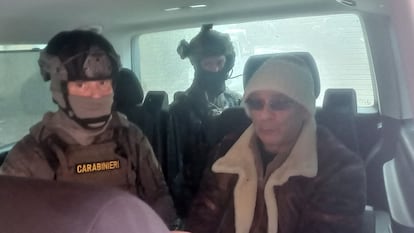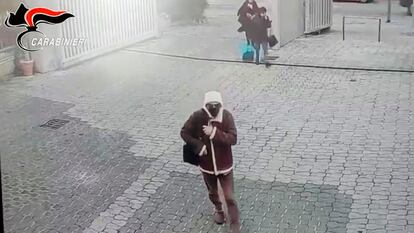Mafia boss Matteo Messina Denaro dies in prison
The 61-year-old Cosa Nostra boss had been Italy’s most wanted criminal for decades

The last godfather of the Sicilian Mafia, Matteo Messina Denaro, who was Italy’s most wanted criminal for three decades, died on Monday from cancer. He was 61 years old. Messina Denaro passed away in the prisoner module of a hospital in L’Aquila. He had been recently transferred there from prison, where he had been serving time since he was captured in January. Messina Denaro died without repenting for his crimes and without revealing the secrets of his extensive criminal career. At the beginning of September, his health conditions worsened, and he was admitted into palliative care, surrounded by heavy security measures. On Friday, he fell into a coma.
Messina Denaro was identified and arrested in January while at a private hospital in Palermo, specialized in oncology therapies. He went to the clinic under the false name of Andrea Bonafede. After his arrest, he was interrogated several times by prosecutors, but refused to collaborate and has taken his secrets to the grave. After his arrest, he was sent to a maximum security prison in L’Aquila, where he was to serve 20 life sentences.
The Mafia boss never gave up a single piece of information about his crimes, such as the details of Toto Riina’s file on government’s involvement with the Mafia and the notorious truce that was struck. “I’ll talk to you, but I will never collaborate,” he said when he was placed in handcuffs. Nor did he repent for his crimes, at least publicly.

Messina Denaro had been a fugitive since 1993, when he vanished after a vacation in Forte dei Marmi (Tuscany). At that time, he was facing charges and convictions for crimes of mafia association, bombings, robberies, possession of explosives and some 40 murders. Although investigators were unable to find him, the Italian government remained intent on his capture. In the end, he was hiding out just six miles from his home, in Campobello di Mazara, a small town in Sicily. During his years as a fugitive, he never lost power.
Indeed, after the 2006 arrest of Bernardo Provenzano, who had been then head of the Cosa Nostra, Messina Denaro took over control of the Sicilian Mafia — even though he was still on the run. His ability to evade authorities compromised the reputation of Italy’s justice system and police.
While his picture hung in police stations across Italy and halfway around the world, Messina Denaro casually went to the bar, shopping or to the pizza restaurant in his native Sicily. He even often went to a Palermo boutique to indulge in luxury treats, such as the €35,000 ($38,000) Franck-Muller watch he was wearing when he was arrested. The official account of his capture has still not answered the most repeated question: why had no one managed to arrest him in 30 years? Judges and numerous experts have tried to explain that he was protected by omertá, the code of silence observed in the region.
Messina Denaro enjoyed three levels of protection: high-level, involving administration officials and politicians (multiple arrests have been made over the years); mid-level, involving the businesspeople who liaised with his profitable companies, as well as the doctors, lawyers and service providers who looked the other way — what authorities call the “mafia bourgeoisie;” — finally, ground-level: no one in the town of Campobello di Mazara or Castelvetrano betrayed him, indeed they saw him as a benefactor.
He was the last symbol of a terrifying era for Italy, marked by the unlimited power of the Mafia, assassinations, shootings and attacks against judges, elected officials, journalists and even against the artistic heritage of the country. The worst moments of this period were during the 1980s and 1990s. With bloodthirsty leaders such as Messina Denaro at the helm, the Mafia was a major challenge for the Italian state. Not only did it have to deal with the impunity enjoyed by Mafia leaders, it also witnessed the assassinations of prominent anti-Mafia judges such as Giovanni Falcone and Paolo Borsellino, who were both murdered in 1992. Messina Denaro was also responsible for around 50 deaths, including children and pregnant women.
Ruthless and paranoid
Testimonies about the capo, who had not set foot in prison until January, paint the picture of a ruthless Mafia boss, who was willing to kill even innocent people. It was said that he was perhaps even more cunning than other capos, and certainly more cautious. This caution bordered on paranoia: he left no trace as to his whereabouts. After his arrest, Italy was divided between those who thought Messino Denaro was arrested and those who believe he let himself be arrested. “Yes, I am Matteo Messina Denaro,” he calmly replied to the Italian police officers when they asked his name.
One of the judges who best knows the Messina Denaro case is Roberto Scarpinato, who investigated Cosa Nostra and the Corleonesi Mafia for years, forming part of Falcone’s legendary anti-Mafia team. He pointed to a disturbing incident that happened ahead of Messina Denaro’s arrest. “Two months ago, another important mafia boss in jail, Giuseppe Graviano, sent one of his men to publicly announce on television that MMD was seriously ill and would allow himself to be arrested in exchange for a secret negotiation that would allow the release from prison of other mafia chiefs sentenced to life imprisonment for the attacks,” he said. Not long after, Messino Denaro was captured in Palermo.
The Corleonesi Mafia clan, originally from the town of Corleone, overtook the Sicilian Mafia in the 1980s. They murdered the entire old guard of the Palermo mafia families, who were more bourgeois than the Corleonesi. The mafia’s chiefs, Toto Riina and Bernardo Provenzano, were ruthless. Messina Denaro was a partner of both. Riina was captured in 1993, and his successor, Provenzano, was arrested in 2006 and died in 2016. From that criminal group, only Messina Denaro had remained free.
The Mafia boss was born in Castelvetrano (Trapani) in 1962. He was a high school dropout, and in the book L’invisibile (The Invisible), written by Giacomo Di Girolamo, the kingpin wrote in a 2015 letter recovered by the police: “I have some regrets in my life, not having studied is one of them. It was one of the biggest mistakes of my life, my biggest anger is that I was a good student, I just got distracted by something else.”
That “something else” was probably organized crime. Messina Denaro followed in the footsteps of his father, who was a local Cosa Nostra capo who lived on the run for eight years. Unlike other big capos, such as Toto Riina or Provenzano, Messina Denaro — who was also known as U’Siccu (The Dry One) or Diabolik — never married and was never surrounded by a traditional family.

His sister Patrizia — who was arrested in 2013 and is behind bars after being convicted for being a member of the Mafia — was his No.2 and represented him at Mafia meetings. She was also in charge of extortion and the capo’s communications network. His nephew Francesco was arrested the same year. Another of his sisters, Rosalia was arrested last March. She was accused of managing the Mafia’s accounts and covering her brother’s economic needs while he was in hiding. She was also in charge of distributing the pizzini, the little pieces of paper with which the Mafia communicate their orders to the rest of the organization. This system allowed Messina Denaro to continue to issue orders while on the run.
Sign up for our weekly newsletter to get more English-language news coverage from EL PAÍS USA Edition
Tu suscripción se está usando en otro dispositivo
¿Quieres añadir otro usuario a tu suscripción?
Si continúas leyendo en este dispositivo, no se podrá leer en el otro.
FlechaTu suscripción se está usando en otro dispositivo y solo puedes acceder a EL PAÍS desde un dispositivo a la vez.
Si quieres compartir tu cuenta, cambia tu suscripción a la modalidad Premium, así podrás añadir otro usuario. Cada uno accederá con su propia cuenta de email, lo que os permitirá personalizar vuestra experiencia en EL PAÍS.
¿Tienes una suscripción de empresa? Accede aquí para contratar más cuentas.
En el caso de no saber quién está usando tu cuenta, te recomendamos cambiar tu contraseña aquí.
Si decides continuar compartiendo tu cuenta, este mensaje se mostrará en tu dispositivo y en el de la otra persona que está usando tu cuenta de forma indefinida, afectando a tu experiencia de lectura. Puedes consultar aquí los términos y condiciones de la suscripción digital.









































